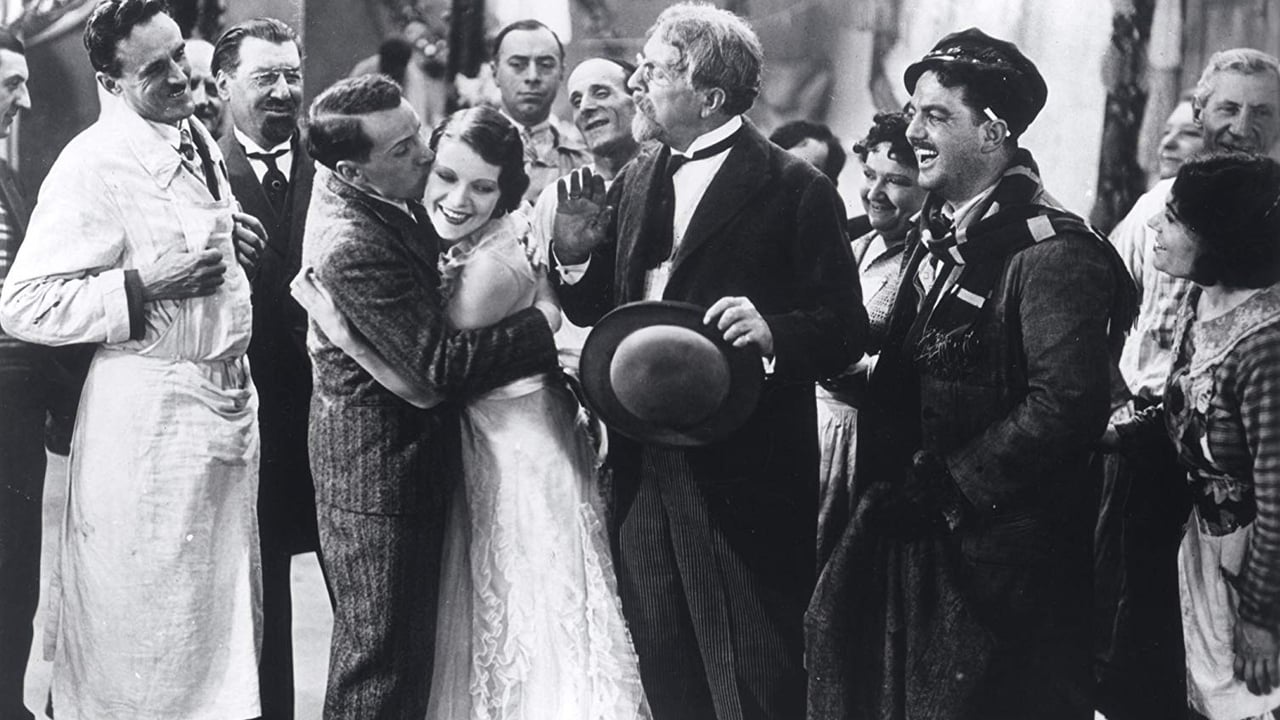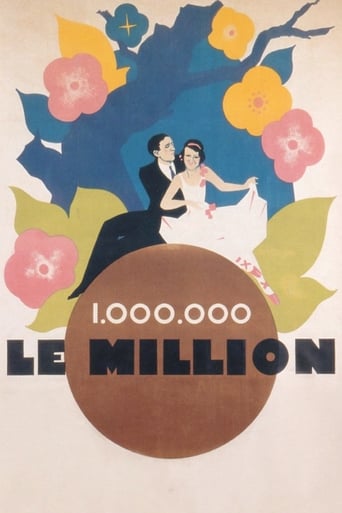

French taste-maker René Clair's early talkie, LE MILLION sees him tackle with an archetypal musical experiment, intelligently weaves diegetic aural accompaniment (three composers are involved) into its caper plot, a tuneful piano piece here, a melodious chorus emerging inside a character's head there, and a large chunk of the farce is circumscribed inside a theater where LES BOHÉMINES is on to boot. The plot is a no-brainer, Michel Bouflette (Lefèvre), a down-and-out artist, albeit of being assailed by debtors (butcher, grocer etc.), he is still inclined to cop a feel with a hussy Vanda (Gréville), which ruffles the feathers of his fiancée Béatrice (Annabella). When his friend Prosper (Allibert, devilish handsome) delivers him the thrilling news that they have won the lottery for one million Dutch florins, only to their dismay, the lottery ticket is inside Michel's jacket which has been given away to a criminal mastermind Grandpa Tulip (Ollivier) by Béatrice. So the rest of the story is a race to trace the where-about of the jacket and try to reclaim the ticket, from Grand Tulip's shop, a camouflage for his unlawful business, to a stint in the police office (where Prosper turns Janus-faced), then the opera theater where a tenor Ambrosio Sporanelli (Siroesco) decides to wear the said jacket to perform in public. It is a cat-and-mouse knockabout between team Michael and team Prosper, both are aided by a female sidekick (Béatrice and Vanda respectively), which is a common trope being played again and again ad nauseam, even. While a third party, namely Grandpa Tulip's men, also lay their hands on the jacket, not for the lottery, surprisingly, but to reciprocate the kindness to whom Grandpa Tulip is beholden, which means a celebratory ending! Clair has a distinguished flair in sublimating Parisian cityscape for audience's admiration and a dab-hand who can infuse alluring sophistication into the film's chipper comedic agility and timing, the cast is animated and gung-ho, to a point of betraying an impression of self-awareness, as if to reaffirm their rapt viewers that it is a show for laughter, all in all, a brilliantly maneuvered divertissement throbbing with elation and kinetics.
... View MoreIt begins with a wondrous swoop of the camera over the rooftops of Paris, at night. A man climbs a ladder and peeks into a lit skylight. There's a party going on, below. The party-goers ALL look up and see the man and tell him, IN SONG, that they're celebrating and they have a story to tell. They toss him a bottle of champagne. They sing and dance, as the shot dissolves to a couple alone in the room, kissing. It's an astonishing opening sequence. And so Rene Clair begins to weave his magical, charming, funny story. I like to bore people by telling them that I can tell if I'm going to like a movie within the first five minutes. "Le Million" took me all of five seconds. It is nothing more or less than a farce, a romp, with people of all shapes and sizes, all with varying motives tearing through hallways and popping in and out of doorways with dizzying regularity. Two coinciding chases collide. A "serious" opera morphs into a game of touch football. And every so often - quite often, in fact - people just start singing! There's a lovely operetta duet onstage that frames the real thing going on behind the scenes. And best of all, with all the fun poked at various characters, and all the little satirical jabs, there isn't a mean-spirited moment in the entire film. How rare is that? I wonder if Blake Edwards thought of this film when he was writing the script for "Victor/Victoria". And yes, Virginia, there is a fat lady - and she sings!
... View MoreThis is one irresistible great cheerful- and technically greatly made movie!The movie features some of the greatest looking sets you'll ever see in a '30's movie, even though it's all too obvious that they are sets, rather than real place locations. Often if a character would fall or shake a doorpost too aggressive, the entire set would obviously move.The best moments of the movie were the silent, more old fashioned, slapstick kind of moments. It shows that René Clair's true heart was at silent movie-making. The overall humor is really great in this movie. Also of course the musical moments were more than great. This is a really enjoyable light and simple pleasant early French musical. Though the best moments are the silent moments, that does not mean that the movie is not filled with some great humorous dialog, that gets very well delivered by the main actors, who all seemed like stage actors to me, which in this case worked extremely well for the movie its overall style and pleasant no-worries atmosphere. No wonder this worked out so well, since this movie is actually based on stage play by Georges Berr.It's a technical really great movie, with also some great innovation camera-work in it and some really great editing, that create some fast going and pleasant to watch enjoyable sequences. There is never a dull moment in this movie!René Clair was such a clever director, who knew how to build up and plan comical moments within in movies. It's a very creative made movie, that despite its simplicity still at all times feel as a totally original and cleverly constructed movie, that never seizes to entertain.The last half hour is especially unforgettably fun, without spoiling too much, and is really among the greatest, as well as most creative moments in early comedy film-making.The movie is filled with some really enjoyable characters, who are of course all very stereotypical and silly and were obviously cast because of their looks. It all adds to the pleasant light comical atmosphere and cuteness of the movie.One of the most pleasant movies you'll ever see!8/10http://bobafett1138.blogspot.com/
... View MoreI have lately got into the habit of purchasing any interesting DVD that the Criterion company releases. I figure that even if I dislike the movie, Criterion usually supplies enough extra material to compensate for any shortcomings in the actual film. I read up on them, and I buy the ones which are the most interesting to me.Le Million is my latest purchase, and I must say that I was not disappointed in the film. It is cheery, funny, and romantic. Everything about it is quite excellent. The songs are wonderful. If I understood French, I would probably hum them and sing them all day long. The acting is very good for this kind of movie. American musicals of the classic Hollywood era relied more on song and dance than the actual characters and story, but in Le Million, the characters are rather well developed and the story, while not being anything extremely impressive, is not at all lacking. I loved the developments of the relationships, especially the relationship between the once best friends Michel and Prosper. The romantic moments are also very well developed. The direction is nearly perfect, with several very memorable moments. Probably the single most perfect scene of the film occurs right after the lead couple has an argument. They hide on the stage of an opera performance, and the opera singers sing lines which the couple, Michel and Beatrice, interpret to their own situation. This is definitely one of the high points in cinema history. The scene managed to make me laugh, to win me over with a very sweet romance, and make me smirk at just how clever the director was. I give this film a 9/10.P.S. - Some information for anyone who has the same faith in Criterion that I do and is planning to buy it. Amongst the Criterion discs I now own, Le Million contains the fewest features. All it has is a photo gallery (not all that useful; one might flip through it once) and a rare television interview with Rene Clair, the director. This piece is of some interest. He was one of the many directors who had started out in silent film, and when talkies were first appearing, he said that they represented the death of film. I think most film-savvy people understand what these directors meant when they said that, but it is interesting to hear him explain it. Also, if you have read the description of this movie on Amazon.com, please note that they were wrong in one important respect: not every line in the film is sung. In fact, it contains no more songs than a regular musical. It is actually a lot more like a Chaplin or Buster Keaton or Marx Brothers film. My criticisms of the disc are not that important. Heck, Criterion has the right to smack me around for making those complaints. The fact is, their people probably spent hundreds of hours fixing up a film which only 20 (now 21!) people have voted for on imdb, and only about a hundred people, if that, will ever see the film. Heck, if you look at the Criterion web site, Le Million is nowhere to be found. I have no clue why not. It's something they should really be proud of (of course, their web site is surprisingly horrible). They did a fine job on this film. Bravo! They deserve all the money I can stand to give them!
... View More